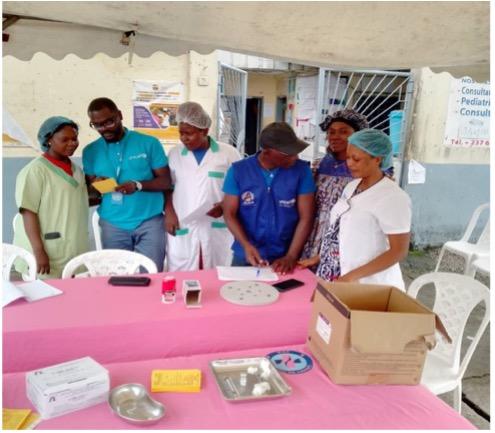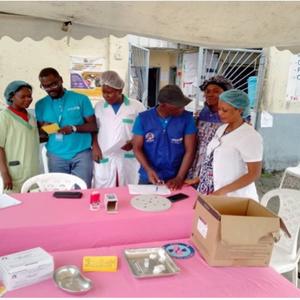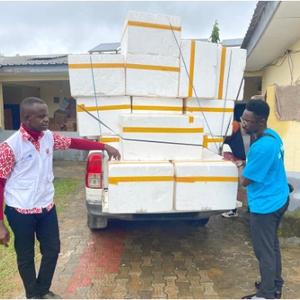Behind Every Successful Campaign: The Cold Chain's Vital Role in Cameroon’s Polio and Immunization Efforts

Vaccination Campaigns: A Coordinated Effort
Vaccination campaigns, like those against polio in Cameroon, are monumental endeavors requiring meticulous planning and execution. Far beyond administering vaccines, these campaigns involve complex logistical processes to ensure each dose reaches its destination safely and on time. One of the most crucial elements in this process is cold chain management, which ensures that vaccines remain at the required temperature throughout their journey. This is particularly vital for vaccines, such as those used in polio eradication efforts, that must be stored and transported under strict conditions. In Cameroon, UNICEF’s role in managing the cold chain system is indispensable, safeguarding the potency of vaccines and ensuring the success of each immunization effort.
UNICEF and Cold Chain Management in Cameroon

In the fight against preventable diseases like polio, yellow fever, and measles, the importance of cold chain management cannot be overstated. UNICEF Cameroon has been a key player in ensuring the integrity of vaccines through its involvement in procurement, storage, and distribution. By maintaining the cold chain from factory to health facilities, UNICEF ensures that vaccines are not compromised by temperature fluctuations, which could render them ineffective.
In Cameroon, vaccination efforts—whether routine immunizations or large-scale campaigns—rely on cold chain logistics to function efficiently. The recent response to yellow fever in Littoral, for example, demonstrated the critical importance of having a robust cold chain system in place, especially when time-sensitive vaccines must be delivered swiftly to protect vulnerable populations.
The Role of Cold Chain in Polio Vaccination Campaigns
For vaccines like those used in polio eradication, maintaining strict temperature controls is essential. Polio vaccines, which are highly sensitive to heat, must be kept cold throughout transportation and storage. Any lapse in this chain could lead to vaccine spoilage, putting entire communities at risk. To address this, UNICEF Cameroon’s cold chain specialists work tirelessly to manage vaccine storage and distribution across the country, ensuring that even remote health districts receive vaccines in optimal condition.

UNICEF’s Commitment to Cold Chain Logistics in Polio Campaigns
In collaboration with Cameroon’s Ministry of Public Health, UNICEF has deployed specialized logistics and cold chain management teams. These teams ensure that every step of the vaccine journey—from procurement to administration—is tightly controlled and monitored. For the current yellow fever vaccination campaign in Littoral, and for ongoing polio vaccination efforts, a dedicated team of seven UNICEF/ALIMA national consultants in logistics and vaccine management, as well as international experts, were deployed in Douala before the campaign officially began. Their goal: to manage the cold chain process to protect the potency of the vaccines.
Since arriving in Douala, these teams have been working on vaccine distribution plans, verifying storage conditions, and organizing the transportation of vaccines to all nine health districts. By doing so, they ensure that each health district has a continuous supply of quality vaccines. Their work doesn’t stop at delivery; they remain engaged throughout the campaign, overseeing the following key areas:
· Ensuring constant vaccine availability to teams across health districts.
· Managing vaccine usage data such as doses received, doses administered, and monitoring vaccine losses.
· Handling reverse logistics, including proper waste collection and environmentally safe disposal of medical materials.
UNICEF Cold Chain’s Impact on Polio Eradication in Cameroon
For a campaign to succeed, particularly one aimed at eradicating a disease like polio, it’s not just about getting vaccines to people—it’s about ensuring that the vaccines administered are of the highest quality. Without the logistical backbone provided by cold chain management, vaccines could degrade and lose their effectiveness, jeopardizing entire campaigns.
“No vaccine, no vaccination” is a well-known phrase in public health, but it goes further: “No quality vaccines, no immunization.” For UNICEF Cameroon, the mission isn’t simply to vaccinate but to guarantee that every vaccine is potent and effective when it reaches the person who needs it. This dedication is especially crucial in polio vaccination campaigns, where the integrity of each dose can mean the difference between success and failure in disease eradication.
Polio Vaccination Success Through Cold Chain Integrity
The ongoing work of UNICEF Cameroon in maintaining cold chain systems ensures that Cameroon’s polio vaccination campaigns remain successful. By safeguarding vaccine quality and ensuring timely delivery, UNICEF helps protect millions of children from preventable diseases like polio. This work underscores the crucial, often unseen role of logistics in public health—particularly in maintaining the cold chain.
The success of polio vaccination campaigns in Cameroon wouldn’t be possible without the coordinated efforts of multiple teams, from local health workers to international experts. UNICEF Cameroon plays a vital role not only in logistical management but also in fostering collaboration between central and regional Expanded Programme on Immunization (EPI) teams, technical partners, and local health districts. Together, they work to ensure that polio vaccines reach every corner of Cameroon, protecting children and communities from the debilitating effects of the disease.
UNICEF Polio Success: A Collaborative Effort
As Cameroon continues to battle polio and other preventable diseases, cold chain management remains the unsung hero of vaccination efforts. Through the hard work of UNICEF Cameroon and its partners, vaccines are delivered safely, stored correctly, and administered to the people who need them most. Every vaccination campaign, whether against polio, yellow fever, or measles, depends on the integrity of the cold chain to protect lives and safeguard communities.
If your team has insights or field experiences related to vaccine logistics, the UNICEF Polio Social and Behavior Change team would love to hear your stories. Sharing these experiences helps shine a light on the critical, behind-the-scenes work that makes immunization campaigns a success.
Written by Pascal Adouabou, UNICEF Cameroun SBC Specialist
Edited by Daria Shubina, UNICEF NY HQ Polio SBC Knowledge Management Specialist

